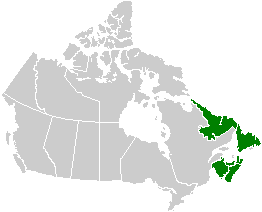 Map of the Atlantic provinces. See Image: in order toCanada provinces blank vide.png for additional information. (Photo credit: Wikipedia)
Map of the Atlantic provinces. See Image: in order toCanada provinces blank vide.png for additional information. (Photo credit: Wikipedia)Employers in Atlantic Canada who wish to hire foreign talent through the Atlantic Immigration Pilot Program (AIPP) must first receive employer designation.
The AIPP is an immigration pilot program, introduced in 2017 for a three-year period. It allows eligible skilled workers, intermediate level workers, and international graduates to become permanent residents of Canada and immigrate to one of the Atlantic provinces, namely Nova Scotia, New Brunswick, Prince Edward Island, and Newfoundland and Labrador.
All programs under the AIPP are employer-driven, meaning that applicants require atosatisfy the criteria. As such, local employers play a big role in the process.
There is no Labour Market Impact Assessment process under the AIPP. However, employers must still follow a few steps in order to hire through this program.
Under the AIPP, employers also work with settlement service provider organizations in their province. This will help newcomers settle and integrate in Canada.
The employer designation process and settlement service provider organizations are different for each province:
- Nova Scotia employer requirements
- New Brunswick employer requirements
- Prince Edward Island employer requirements
- Newfoundland and Labrador employer requirements
In all cases, the employer must send the job offer, the settlement plan for each adult family member, and an endorsement application to the province for review. If the province approves the application, they will send the applicant/candidate an endorsement letter. This letter must be included with the immigration application.
Nova Scotia AIPP employer requirements
Employers in Nova Scotia looking to fill persistent labour gaps through the AIPP must first be approved for eligibility by being designated and then endorsed by the province.
To become designated, an employer must:
- Have a business operating in good standing;
- Provide information on labour needs; and
- Commit to working with a service provider organization on settlement and retention
To become endorsed, an employer must:
- Demonstrate efforts to hire locally have not been successful;
- Recruit a foreign worker;
- Provide a valid, full-time, non-seasonal job offer co-signed with the foreign worker; and
- Provide an individualized settlement plan co-signed with the foreign worker.
Employers must also work with a settlement service provider in the province. See below for a list of currently available providers.
New Brunswick AIPP employer requirements
Employers in New Brunswick interested in participating in the AIPP must meet the following designation criteria:
- The employer wants to hire full-time, non-seasonal international candidates;
- The employer and their business are well-established and in good standing; and
- The employer is committed to meet the settlement needs of international candidate(s) and accompanying family members.
Prince Edward Island AIPP employer requirements
Employers in PEI interested in participating in the AIPP must meet the following designation criteria.
The employer must:
- Want to hire full-time, non-seasonal international candidates;
- Be in good standing with provincial and federal standards and legislation;
- Demonstrate preparedness to receive and meet the settlement needs of international candidate(s) and accompanying family members, and agree to do so; and
- Understand and agree to the reporting requirements for the program.
The Employer Designation Application Form must be completed before you can apply for endorsement of a foreign national under the Atlantic Immigration Pilot. Designated employers are eligible to apply for endorsement of a foreign national they wish to hire.
Newfoundland and Labrador AIPP employer requirements
Designation is the first step for employers in Newfoundland and Labrador interested in participating in the AIPP. The designation process is designed to confirm that:
- The AIPP is the immigration program best suited to address the employer’s needs;
- The employer wants to hire full-time, non-seasonal international candidates;
- The employer and their business is established and in good standing as per the program guidelines;
- The employer has demonstrated their preparedness to receive and meet the settlement needs of international candidate(s) and accompanying family members, and has agreed to do so; and,
- The employer understands and agrees to the reporting requirements for the program.





